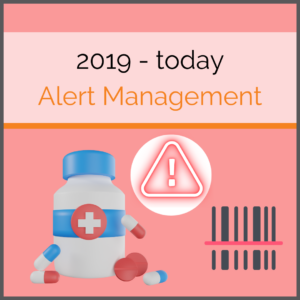
The topic of alert management has been on the minds of pharmaceutical companies since the first medicine packs were scanned in a pharmacy in 2019. Especially at the beginning of the implementation of the EU-FMD, alerts were mainly caused by incorrect handling in pharmacies. In the meantime, the system has become established, and the causes of the alerts increasingly lie with the manufacturers and serialization. The EMVO AMS portal now enables alerts to be processed in a structured and transparent manner, but not all pharmaceutical companies implement alert management consistently. We provide an overview of developments since 2019 and explain why it is crucial to implement active alert management.
Chronological overview of alert management 2019-today
- The EU-FMD has had to be implemented since February 2019. Especially at the beginning, error reporting attracted a lot of attention. The conversion of pharmacies to the new processes and systems, as well as the newly introduced serialization software in pharmaceutical companies, led to numerous error messages. They accounted for around 5% of the data reported daily in the German securPharm system.
- One year after the introduction of the EU FMD, the number of error reports is still high. 0.42%, meaning there were 15,000 to 20,000 alerts per day in Germany alone. The causes are primarily technical problems: scanner settings, print quality, duplicate write-offs in the pharmacy, or incorrect serialization data.
- In September 2020, we conducted an internal survey of our customers concerning alert management. The qualitative survey cleared that our customers urgently want a functional tool. In their opinion, the official AMS came too late.
- Since February 2023, pharmaceutical companies have used the AMS portal to process their alerts. It is a joint project of the National Medicines Verification Organizations (NMVS), EMVO, and other organizations.
What are the benefits of the AMS portal for pharmaceutical manufacturers?
Looking at the figures for error reports, it becomes apparent that active alert management was not very effective for companies, especially in the first one to two years after the launch of the EU FMD. These were mainly error messages caused by incorrect handling of the scanners and handling of the new processes in the pharmacies. Today, the cause of most error messages lies with the pharmaceutical companies.
For our customers, these are the top 4 causes of error messages:
- In the system, the pack is stored as “active.” Subsequently, it was already verified.
- The serial number is misspelled
- Characters are missing in the batch ID.
- Characters are missing in the serial number.
Pharmaceutical manufacturers are not obliged to use the AMS portal for alert management. Nevertheless, it is highly recommended by the EMVO as it is the most efficient option available. It is worthwhile for manufacturers to take a look at the error messages for their products. Not least because the authorities now expect timely de-escalation, and companies may face penalties if they do not adhere to the time limits set by the individual national authorities. The timeframe for de-escalation ranges from as quickly as possible (e.g. in Denmark) to 14 days (e.g. in the Czech Republic).
It is a long-term issue if hundreds of packs cannot be sold because they were removed from circulation due to an error message. The solution is simple: Alerts can be processed through the AMS portal and de-escalated accordingly.
Why isn’t everyone using the AMS yet?
Although the Alert Management System has been eagerly awaited by many pharmaceutical companies, it is not yet being used across the board. There may be various reasons for this, depending on the company. However, one of the main reasons could be the personnel situation at the pharmaceutical manufacturers. Even if it is now easier to process alerts via the AMS, it is still a time factor. Depending on the size of the company or the number of prescription medicines, it can take more than two hours a week to process the error messages. In addition, not all NMVS are yet connected to the portal. Familiarization with the new system also takes time, which is not available when personnel resources are scarce.
A lot has happened since the introduction of the new serialization systems. The provision of a functional AMS has now significantly simplified the processing of error messages. Sooner or later, all pharmaceutical manufacturers will actively deal with their alert management to meet the legal requirements. Whether they cover this internally or outsource their alert management depends on the company’s preferences.